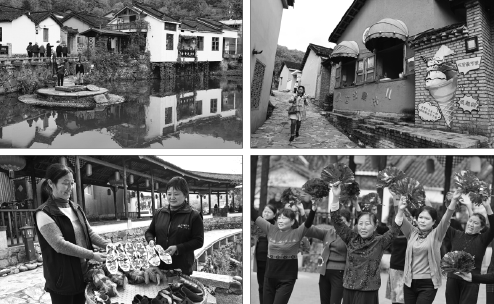Homing in on success
Village embraces red tourism as visitor numbers surge, Chen Meiling and Shi Baoyin report.

After working for about two decades in different parts of the world, Han Guangying finally decided to come back to his hometown, Tianpudawan village in Tianpu town, Xinxian county in Henan province. He was tired of traveling around and wanted to settle down. He believed there was an opportunity to make a fortune, as the once poor and bleak village has changed into a hot rural and red tourism site. His instinct proved correct.
At the village, houses with yellow adobe walls and black tile roofs are embraced by forests, as they are located at the foot of the Dabie Mountains. Walking along the narrow pathway on the flagstone road, doors of shops and homestays open to visitors. Around the clear pond elderly villagers sit and chat.
Xinxian, with a population of 368,000 and an area of 1,612 square kilometers, was once part of the Eyuwan revolutionary base, which comprised parts of Hubei, Henan and Anhui provinces, and was the second-largest base of the Red Army in central China during the war against the Kuomintang. About 55,000 of the 100,000 residents of the county died participating in the revolution.
In recent years, red tourism has taken off in China. Curious, nostalgic tourists want to revisit sites where major historical events happened and understand the spirit of previous generations. The village, as the hometown of general Xu Shiyou, who joined the War of Resistance Against Japanese Aggression (1931-45) and the War of Liberation (1946-49), also saw rising tourism, especially as the country is celebrating the 100th anniversary of the Communist Party of China this year.
Han is the one of the first to have sniffed a business opportunity. In April 2017, after learning his hometown was developing its tourism, he resigned from a shipbuilding factory in South Korea and opened the first homestay in the village after renovating the family's old residence.
"To my surprise, it turned out the number of tourists was so large that I had to refuse 60 to 70 percent of requests," Han says.
Ten days ahead of May 1, Han's bed-and-breakfast was booked up for the five-day holiday. Three rooms and a yard cost 698 yuan ($108) per night during peak season. Han works as boss, waiter, cleaner, cook and tour guide. His wife sells local specialties such as fermented bean curd and honey. Revenue from the business reached more than 30,000 yuan from January to April.
He wants to rent other villagers' houses to expand his business, but it is too hard, as "they want to run their own business too", he says.
He can easily recall when the village seemed no different from many other unknown villages; young people eager to leave to make money, leaving behind the elderly to do farming and take care of children. Now, with more outsiders flowing in, the sense of isolation is over and villagers seem more vigorous, Han says.
The village has 21 homestays, eight restaurants and stores that sell handicrafts and specialties, and offer entertainment to better serve tourists, according to the local government.
At a store selling handmade insoles, Hu Yourong, 52, is busy embroidering a pair. She earns 1,500 yuan a month and started at the store last year. She says many women of her age are making insoles, too, to sell to tourists, with each pair costing 100 yuan. "Before, we planted peanuts and rice and wore the insoles mainly ourselves," she says.
President Xi Jinping visited Tianpudawan in September 2019 to learn about its rural tourism and revitalization by red tourism resources, during an inspection tour in Henan province. He bought a pair of insoles, which made the product a quick seller.
In 2014, as a pilot program to develop a "beautiful village", Xinxian invested about 22 million yuan to improve the village's infrastructure, environment and public services. According to Wang Weidong, head of Tianpu township, Tianpudawan has welcomed 400,000 tourist visits from January to April. The number for the same period last year was 750,000.
Deng Xiqin, a tourist to the village in late April, says she and her colleagues visited the village as part of activities to learn the history of the Party. "The beauty of traditional Chinese villages, which are often surrounded by waters and mountains, is well preserved," she says.
Wang says the most special part of the village is that locals don't need to move out and actively join in the development of tourism, either by running their own business or working for others. He adds they also keep the traditional design and structure of buildings.
"Tourism brings more jobs and has attracted more than 10 families back. It's a way to promote rural vitalization," he says, adding that the average annual per capita income has grown from 3,000 to 4,000 yuan before 2015 to as high as 18,000 yuan now.


Today's Top News
- Wang to meet foreign ministers of Cambodia, Thailand in Yunnan
- China's top legislature concludes standing committee session
- Thailand and Cambodia agree to temporary ceasefire
- NPC's 4th annual session slated for early March
- Civilizational links for a fairer world
- Manufacturing in China spurs global growth






























